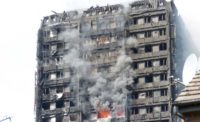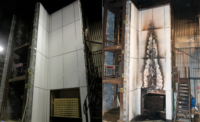"Incompetence and poor practices in the construction industry" and among others led to the June 2017 fire at London's Grenfell residential high-rise building, causing 72 deaths, according to the lead counsel for the public inquiry that ended Nov. 10.
"Each and every one of the risks which eventuated at Grenfell Tower on that night were well known by many and ought to have been known by all who had any part to play," asserted Richard Millett. "Each and every one of the deaths...was avoidable."
Completed in 1974, the 23-floor concrete framed building was owned by Royal Borough of Kensington and Chelsea (RBKC) and managed by an external tenant management organization. In June 2014, the TMO awarded contracts starting the tower's ill-fated refurbishment, including new facades.
Three years later, a faulty refrigerator in a fourth floor kitchen sparked the early morning fire, which escaped through a substandard window and engulfed the building in a few hours.
The newly installed aluminum composite rainscreen panels on the facade's outer face were identified as the vector for rapid fire spread in the inquiry’s first phase, ending three years ago. Arconic Architectural Products SAS, a French subsidiary of Pennsylvania-based Arconic Inc., supplied the “Reynobond PE” rainscreen panels incorporating a thin polyethylene core.
However, “the design of the refurbishment, the choice of materials and the manner of construction" also contributed the disaster, noted inquiry chair Martin Moore-Bick at the time.
While the inquiry's first phase covered the sequence of events around the fire, phase two, just ended, examined its causes. The evidence, claimed Millet in his summing up, revealed failings in the fire engineering, architecture and building control, as well as "cynical and possibly even dishonest practices in the cladding and insulation materials manufacturing sector."
During the inquiry's second phase's 312 days, the parties concerned indulged in a "merry-go-round of buck passing," claimed Millet. "Many...core participants appear simply to have used the inquiry as an opportunity...to minimize their own exposure to legal liability," he said.
Summing up for Arconic, Stephen Hockman perceived "an agenda throughout to subject [Arconic] to condemnation even before the case has been fully heard." Claiming the cladding product "was entirely lawful" at the time, it was up to others at assess its suitability, he asserted.
Costing an estimated $170 million, the whole inquiry drew evidence from around 1,500 witnesses and around 300,000 documents. Its final report is due in the second half of next year.




